Catégories
Documents disponibles dans cette catégorie (47)
 Ajouter le résultat dans votre panier Affiner la recherche
Ajouter le résultat dans votre panier Affiner la recherche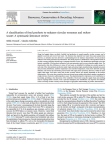
Article
Along food supply chains, one-third of global food production is wasted annually: circular economy can be applied to prevent and recover food waste. The literature has explored food waste from many perspectives; however, no attention has been de[...]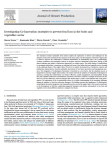
Article
M. Nasso ; E. Blasi ; F. Pezzoli ; C. Cicatiello |The transition towards sustainable food systems implies the exploration of drivers and challenges for the adoption of innovative solutions by the operators on the value chains. The development of innovative approaches is critical to improve the [...]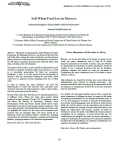
Article
Taking the recommendations of the Regional Strategic Framework for Reducing Food Loss and Waste in the Near East and North Africa region, this study specifically, provides decision makers in Morocco with the necessary information to cut food los[...]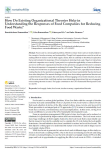
Article
R. Ramanathan ; U. Ramanathan ; K. Pelc ; I. Hermens |Food waste is a serious global problem. Efforts to reduce food waste are closely linked to the concepts of circular economy and sustainability. Though food organizations across the world are making efforts to reduce waste in their supply chains,[...]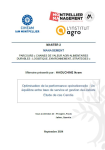
Thèse, Mémoire, Master
Les industries agroalimentaires font face à un marché hautement concurrentiel, les obligeant à se différencier et à se réorganiser, notamment par l’optimisation de la supply chain, et ce afin de garantir la satisfaction client et la réduction de[...]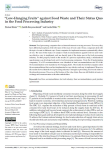
Article
Food processing companies have a financial interest in saving resources. However, they have different perceptions of the relevance of the issue of food waste. Hence, companies deal with the topic of waste in different ways. Some companies do imp[...]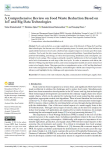
Article
S. Ahmadzadeh ; T. Ajmal ; R. Ramanathan ; Y. Duan |Food waste reduction, as a major application area of the Internet of Things (IoT) and big data technologies, has become one of the most pressing issues. In recent years, there has been an unprecedented increase in food waste, which has had a neg[...]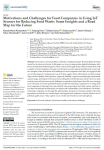
Article
R. Ramanathan ; Y. Duan ; T. Ajmal ; K. Pelc ; J. Gillespie ; S. Ahmadzadeh ; J. Condell ; I. Hermens ; U. Ramanathan |Food waste is a serious problem worldwide, including in Europe. Research efforts are being carried out to reduce food waste. In this paper, we focus on using modern digital technologies (also known as Industry 4.0 technologies) to reduce waste i[...]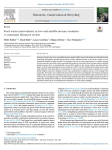
Article
H. Rolker ; M. Eisler ; L. Cardenas ; M. Deeney ; T. Takahashi |Reduction of food waste in low-and-middle-income countries (LMICs) can provide multi-layered benefits for their sustainable development, through improved food security, enhanced income as well as the creation of environmentally friendly secondar[...]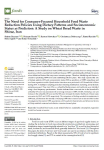
Article
S. Ghaziani ; D. Ghodsi ; K. Schweikert ; G. Dehbozorgi ; H. Rasekhi ; S. Faghih ; R. Doluschitz |Current household food waste (HFW) reduction plans usually focus on raising consumer awareness, which is essential but insufficient because HFW is predominantly attributed to unconscious behavioral factors that vary across consumer groups. There[...]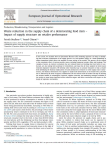
Article
P. Beullens ; Y. Ghiami |In this article, we examine how an Operational Research (OR) modeling approach can help in identifying how structural components in the supply process of a food product subject to a small probability of almost immediate failure affects the amoun[...]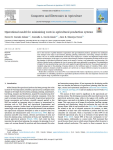
Article
Due to the increase of global demand of agriculture and agro-industrial products, agriculture has undergone some changes in the stages of procurement, planning, planting, maintenance, harvesting, transport and distribution. The use of formal mat[...]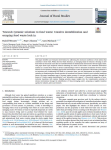
Article
This paper identifies and evaluates interventions for addressing the structural conditions in food systems that contribute to food waste. Within the food waste literature, an emerging strand of research is focusing on how food waste has structur[...]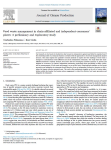
Article
Past research on food waste in foodservices has focused on restaurants in general and failed to examine how/if the ownership model of a restaurant business correlates with the approaches to food waste management adopted in-house. This study empl[...]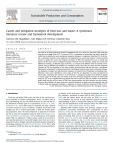
Article
One third of all food produced for human consumption ends up as food loss and waste (FLW) each year along the food supply chain (FSC). To prevent FLW, it is paramount to understand why food is being discarded and to identify the most appropriate[...]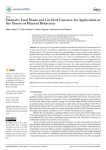
Article
M. Amato ; F. Verneau ; A. Coppola ; F. La Barbera |The ongoing Covid-19 pandemic rapidly and dramatically disrupted household behaviours in almost all areas and, among these, eating behaviours and daily food patterns have also been radically altered. All reported changes have potential effects i[...]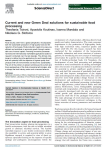
Article
T. Tsironi ; A. Koutinas ; I. Mandala ; N.G. Stoforos |Food security, seen from a global perspective, encompasses both the sustainable production of high-quality food and the reduction of food waste. Food production needs to be resource efficient and contribute to economic growth through sustainable[...]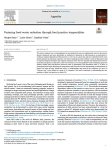
Article
M. Dyen ; M. Dyen ; L. Sirieix ; S. Costa |This article examines how recommendations for preventing food waste are implemented, based on the practice theories framework and more specifically on Southerton's framework in which practices are performed according to temporal dispositions (Wh[...]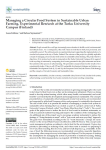
Article
People around the world pay increasingly more attention to health, social, environmental, and ethical issues. As a consequence, they seek value in food that is fresh, less processed, and sustainably sourced. The article presents an experimental [...]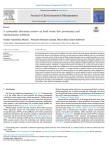
Article
Several initiatives have been proposed to address food waste and loss issues and support stakeholders throughout the food chain. However, the literature still lacks a review paper that compiles methods, practices, and solutions to reduce food wa[...]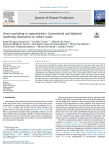
Article
J.U. Gustavo ; L.R. Trento ; M. de Souza ; G.M. Pereira ; A.B. Lopes de Sousa Jabbour ; N.O. Ndubisi ; C.J. Chiappetta Jabbour ; M. Borchardt ; L. Zvirtes |This article seeks to identify and analyze green marketing actions that can reduce food waste (FW) of short shelf life (SSL) products by retailers and to propose effective FW mitigation strategies. The article is based on a multiple case study o[...]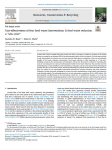
Article
At least 30% of food is wasted during the journey from farm to processor to retailer to consumer in the United States, accounting for an estimated 20% of the environmental impact of the food system. The food waste problem is well characterized, [...]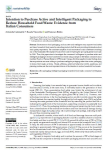
Article
Innovations in food packaging, such as active and intelligent ones, improve food safety and lower household food waste by extending product shelf life and providing information about food quality, respectively. The consumer adoption of such inno[...]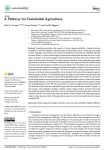
Article
Expanding populations, the impacts of climate change, availability of arable land, and availability of water for irrigation collectively strain the agricultural system. To keep pace and adapt to these challenges, food producers may adopt unsusta[...]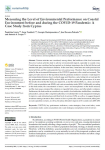
Article
Tourism activities are considered, among others, the backbone of the local economies. However, tourism activities lead to adverse environmental impacts, especially in coastal zones. Coastal areas are considered and recognized as of strategic imp[...]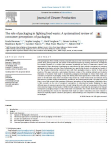
Article
L. Brennan ; S. Langley ; K. Verghese ; S. Lockrey ; M. Ryder ; C. Francis ; N.T. Phan-Le ; A. Hill |Food packaging is often viewed as having a negative impact on the environment. However, packaging can protect food, prolong shelf life, and reduce environmental impact by reducing food waste. Throughout the existing literature it is evident that[...]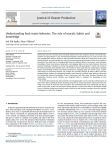
Article
Food waste has been receiving much scholarly attention from the academic domain, non-profit organizations and governments as the environmental damages and financial losses it causes increase each day, prompting the decision-makers to take preven[...]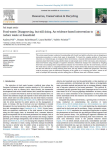
Article
A. Pelt ; R. Saint-Bauzel ; L. Barbier ; V. Fointiat |This action-research project conducted in partnership with French local public authorities aims at designing an intervention procedure to reduce food waste in households. To broach the complex problem of food waste reduction as a behavioral gap,[...]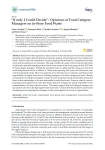
Article
C. Cicatiello ; E. Blasi ; C. Giordano ; A. Martella ; S. Franco |Retail food waste represents a minor fraction of the total amount of food waste produced along the food supply chain (tenfold lower than the quantity of food disposed of by consumers at home). However, the role of retailers is crucial in shaping[...]
Article
The use of intensive high-yield agricultural systems has proved to be a feasible alternative to traditional systems as they able to meet the objective of guaranteeing long-term sustainability in the supply of food. In order to implement these sy[...]








